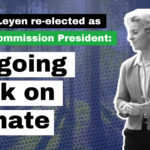The UN Environment Emissions Gap Report 2019 [1] published today shows that in 2020, countries need to dramatically strengthen their 2030 climate targets and sharply accelerate emission cuts.
The report shows that to achieve the 1.5°C goal countries must increase their 2030 climate targets more than fivefold. They also need to cut emissions by about 7.6 per cent per year from 2020 to 2030. This is a massive increase compared to the current trends: over the last five years, the EU has reduced emissions by a meagre 0.25 per cent per year [2].
The report outlines ample opportunities to immediately scale up emission cuts in the G20 countries. For the EU, the list includes stopping investments in fossil-fuel infrastructure, including new natural gas pipelines; a strategy for zero-emission industrial processes; stepping up efforts to phase out coal-fired plants and to retrofit existing buildings.
Wendel Trio, Director of Climate Action Network (CAN) Europe said:
“The report shows that in 2020 we need a massive turnaround in climate policies. 2020 needs to be a major historical turning point, when governments adopt much stronger commitments for 2030 and initiate immediate, drastic cuts in emissions. The hope lies in millions of people taking to the streets, who can force politicians to act according to the recommendations from scientists.”
The report comes just days before the start of this year’s UN Climate Summit COP25, which needs to set out the pathway for 2020. For the EU, COP25 is an opportunity to regain the leadership role by committing to increase its 2030 climate target already in early 2020.
Bringing the EU target in line with the Paris Agreement objective to limit temperature increase to 1.5°C will require reducing emissions by at least 65% by 2030 [3]
ENDS
[1] UN Environment Emissions Gap Report 2019, https://www.unenvironment.org/resources/emissions-gap-report-2019
[2] The latest EEA Trends and Projections Report indicates that EU emissions have fallen from 4.436 GtCO2-e in 2014 to 4.397 Gt in 2018, this represents an annual reduction of 0.25%.
[3] More information on why CAN Europe calls for an increase of the EU’s 2030 climate target to at least 65%: https://caneurope.org/publications/blogs/1740-can-europe-calls-for-an-increase-of-the-eu-s-2030-climate-target-to-at-least-65
At the same time, assuming EU emissions to be around 4.4 GtCO2-e in 2020, a 7.6% annual reduction would lead to emissions at the level of 1.996 Gt in 2030, which is -65% of the EU’s 1990 emissions of 5.726 Gt (source EEA Greenhouse Gas Data Viewer)
CAN Europe COP25 media advisory here
Photo story ‘Faces of the Climate Fight” portaying climate activists here
Print quality images can be downloaded from here
Contact
Ania Drazkiewicz, CAN Europe Head of Communications, ania@caneurope.org, +32 494 525 738
Climate Action Network (CAN) Europe is Europe’s leading NGO coalition fighting dangerous climate change. With over 160 member organisations from 35 European countries, representing over 1.700 NGOs and more than 47 million citizens, CAN Europe promotes sustainable climate, energy and development policies throughout Europe.


